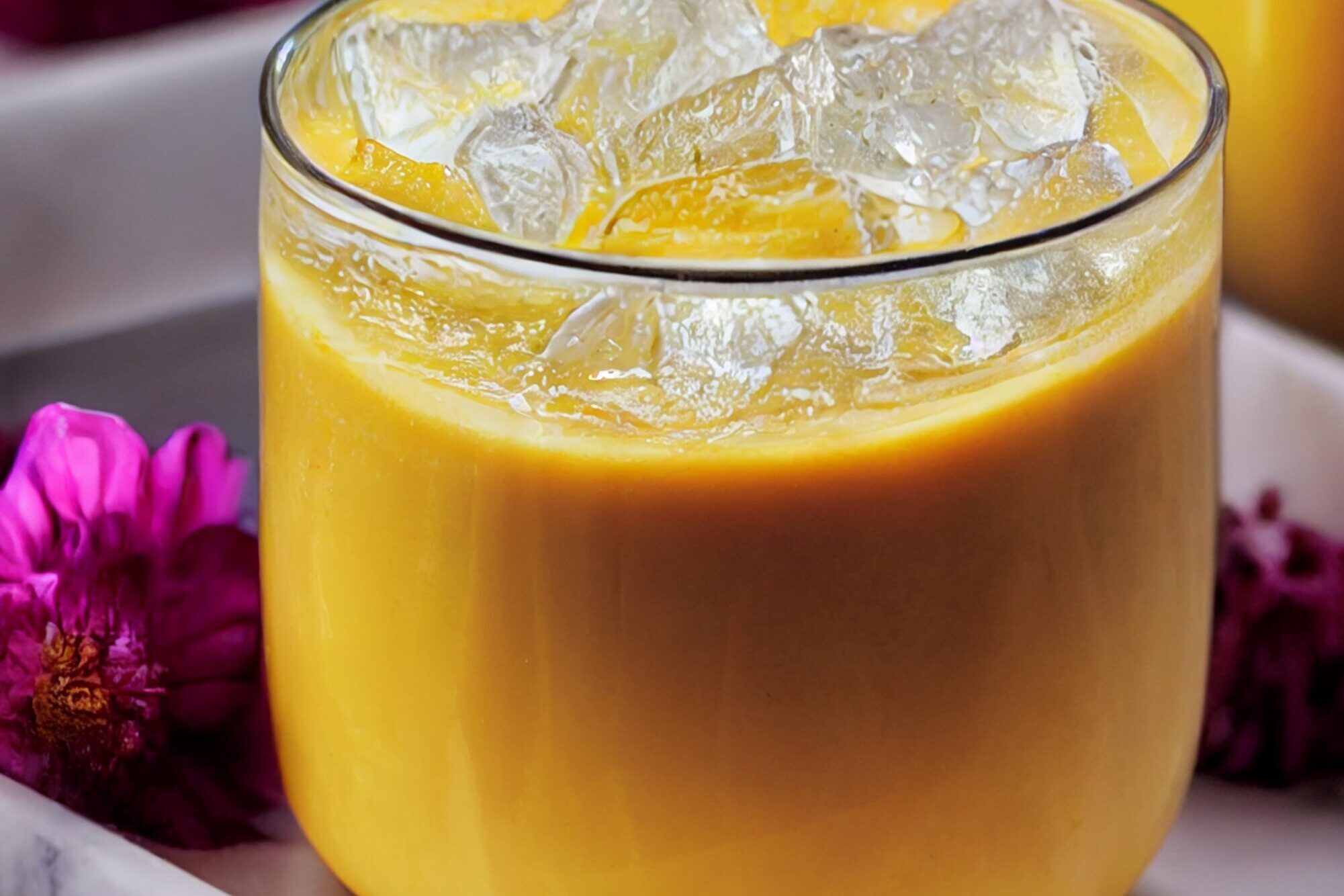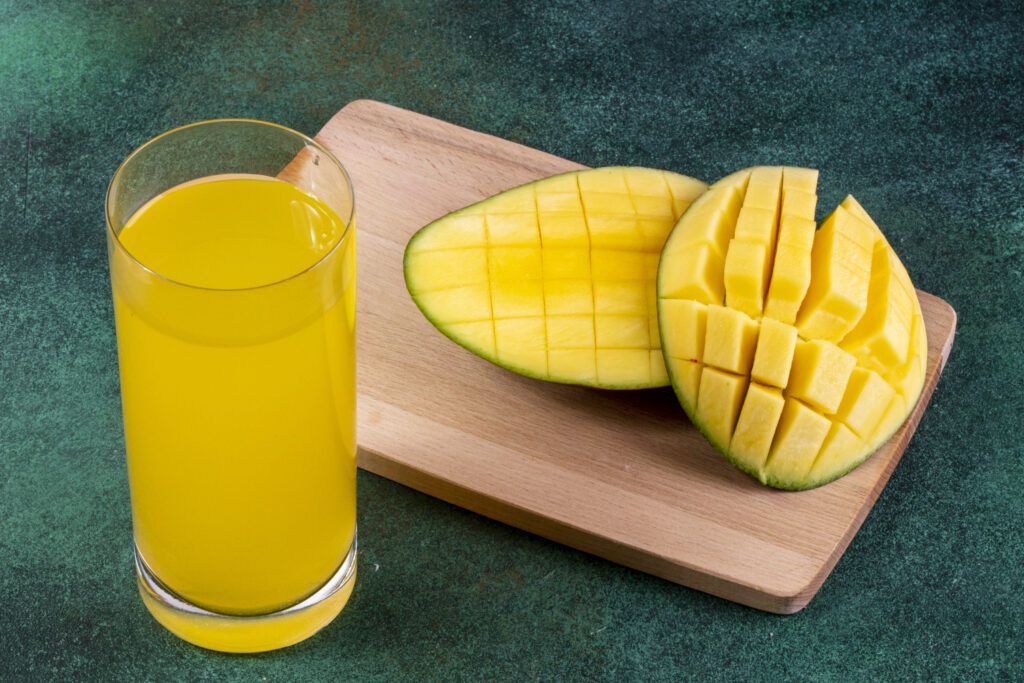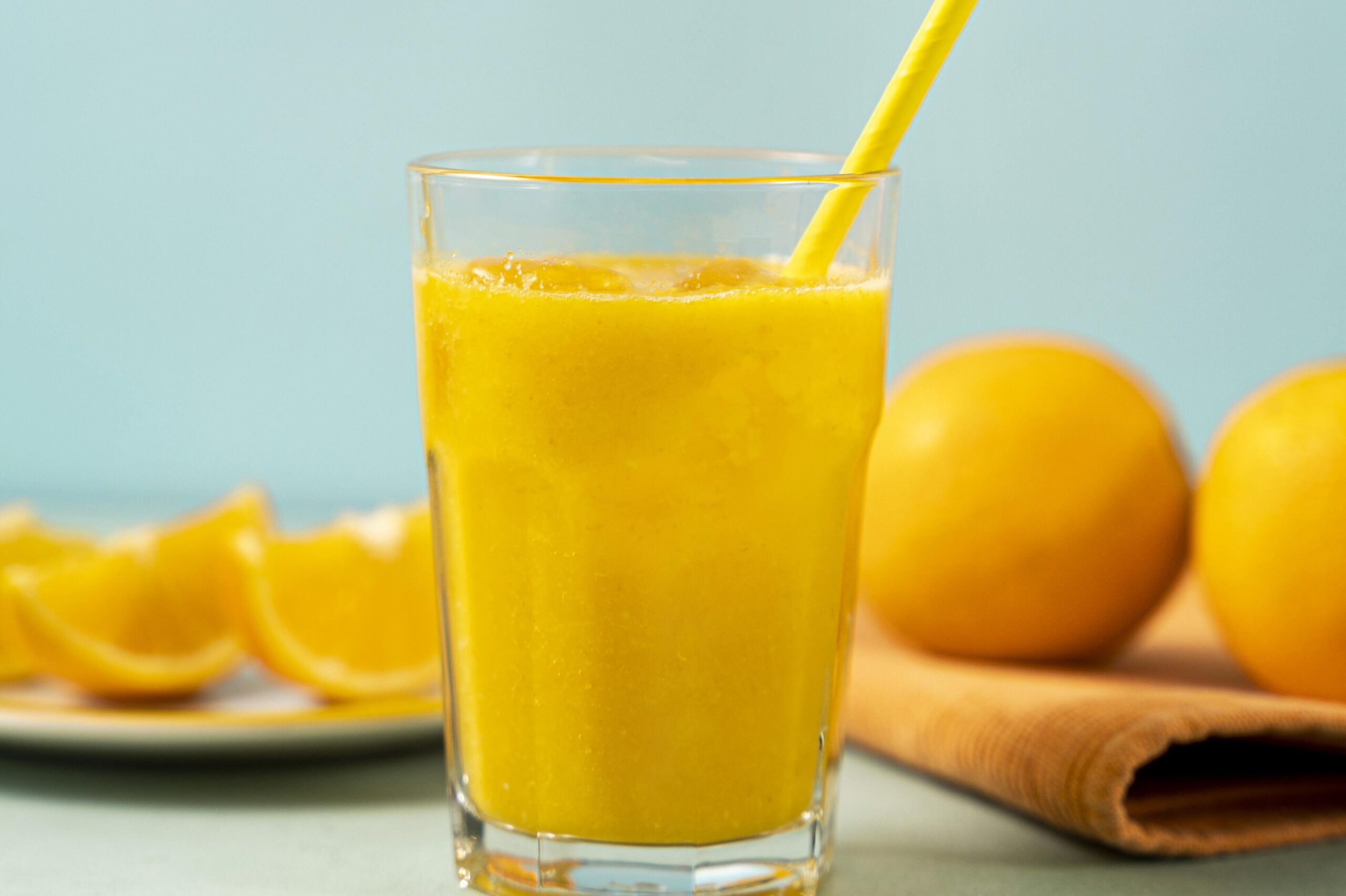
Introduction
Mango juice just the name itself brings a refreshing, tropical feeling to mind. But is it just a sugary drink we enjoy in the summer, or is there more to this golden nectar?
In this article, we’ll explore everything about mango juice:
- Its nutritional value
- Health benefits
- How it affects different age groups
- Natural vs. packaged mango juice
- How to make it at home
- Who should drink it and who should avoid it
If you’re running a health conscious life or running a nutrition focused business, knowing the truth behind mango juice can help you (and your readers/customers) make better decisions.
1. What Is Mango Juice?
It is extracted from ripe mangoes, typically the pulpiest varieties like Alphonso, Sindhri, or Kesar. It’s smooth, thick, naturally sweet, and often blended with water or other fruit juices.
There are two kinds of mango juice:
- Homemade tropical beverage: Homemade, free of preservatives
- Packaged Mango Juice: Available in tetra packs and bottles, often with added sugar or preservatives
Both types taste delicious, but their nutritional values can differ greatly and that’s what we’ll dive into next.
2. Nutritional Profile of Mango Juice (Per 1 Cup 240 ml)
| Nutrient | Amount |
| Calories | 130–150 kcal |
| Carbohydrates | 30–35 g |
| Sugars (natural) | 28–32 g |
| Protein | 1 g |
| Fat | 0.5 g |
| Vitamin C | 60–70% DV |
| Vitamin A | 25% DV |
| Potassium | 10% DV |
| Magnesium | 5% DV |
| Fiber (if pulpy) | 1–2 g |
Note: These values are for homemade, fresh mango juice. Packaged versions may contain more sugars and preservatives.
3. Health Benefits of Mango Juice
1. Boosts Immunity
Mango juice is rich in Vitamin C and Vitamin A, both essential for strengthening the immune system.
- Vitamin C enhances white blood cell production
- Vitamin A protects mucous membranes and supports eye health
2. Good for Skin and Hair
Thanks to its antioxidants like beta carotene and Vitamin E:
- Promotes glowing skin
- Reduces acne and inflammation
- Prevents hair fall and strengthens follicles
3. Supports Digestion
This vibrant tropical fruit is not only delicious but also supports digestive health in a natural way. It contains enzymes like amylase, which assist the body in breaking down complex carbohydrates and improving nutrient absorption. When consumed in its pulpy form, it provides additional dietary fiber an essential component for maintaining regular bowel movements. Including this fruit based drink in your routine may reduce bloating, aid in smoother digestion, and help prevent occasional constipation, especially when it’s fresh and unstrained.
4. Good for Eye Health
Rich in Vitamin A, this golden tropical drink plays a supportive role in maintaining healthy vision. Regular consumption can contribute to sharper eyesight, especially in low-light conditions, and may also help prevent common eye issues like dryness and night blindness. The natural antioxidants present in the fruit support overall eye health, making it a valuable addition to your daily diet particularly for those concerned about screen time or aging vision.
5. Improves Heart Health
Rich in potassium and magnesium, mango juice can:
- Support stable blood pressure
- Improve blood flow
Reduce the risk of cardiovascular diseases

4. Fresh vs. Packaged Mango Juice: Which One’s Better?
| Criteria | Fresh Juice | Packaged Juice |
| Nutrient Content | High (no processing) | Lower (due to pasteurization) |
| Sugar Content | Natural sugars only | Added refined sugar |
| Preservatives | None | Usually added |
| Taste | Rich, authentic mango flavor | Varies, may taste artificial |
| Shelf Life | 1–2 days | Months |
Verdict: Freshly prepared fruit blends are significantly richer in nutrients and far healthier compared to store-bought options. However, if you do choose packaged beverages, make sure to carefully read the ingredient label. Look out for high levels of added sugar, artificial preservatives, and synthetic colorants as these can reduce both the nutritional value and safety of the drink. Choosing clean, natural options is always a better decision for your health.
5. How to Make Mango Juice at Home (3 Simple Recipes)
1. Classic Mango Juice
Ingredients:
- 2 ripe mangoes
- 1 cup chilled water
- A pinch of black salt (optional)
- Ice cubes
Steps:
- Peel and cut the mangoes
- Blend with water
- Add ice and salt if desired
- Strain if needed (optional)
2. Mango Mint Cooler
Ingredients:
- 1 cup mango pulp
- 5 mint leaves
- 1 tbsp lemon juice
- Chilled soda water
Steps:
- Mint infused juice blend
- Add lemon juice
- Mix with soda
- Serve chilled
3. Mango Honey Detox
Ingredients:
- 1 mango
- 1 tbsp honey
- ½ cup water
- 1 tsp chia seeds (optional)
Steps:
- Blend all ingredients
- Let chia soak in the drink for 15 minutes
- Enjoy it as a detoxifier
6. Who Should Drink Mango Juice (and Who Should Avoid It)
Recommended For:
- Children: Energy + Vitamins
- Athletes: Quick carbs for recovery
- Elderly: Easy to digest nutrition
- Pregnant Women: Iron + folate content (with doctor’s advice)
Not Recommended For:
- Diabetics: Due to high natural sugar
- People with PCOS/Insulin Resistance: Can spike glucose
- Obese individuals on weight loss diets: It’s calorie dense
- Acid reflux patients: Mangoes may trigger symptoms in some cases

7. Mango Juice in the Summer: A Natural Cooler
Refreshing summer rituals in Pakistan and India. It helps:
- Cool down body temperature
- Prevent heat stroke
- Restore lost electrolytes
Mixing mango juice with black salt or lemon makes it even more hydrating and beneficial during hot weather.
8. Mango Juice for Kids: Safe or Not?
Healthy drinks for young children, as long as:
- It’s freshly prepared
- No added sugar
- Given in moderation
Too much can cause:
- Upset stomach
- Diarrhea
- Excess sugar intake
Tip: Dilute it with water and don’t offer it daily.
9. DIY Mango Juice Without a Blender
No blender? No problem. Here’s an old-school trick:
- Soften mangoes by rolling them on the table
- Make a small hole on top
- Squeeze the juice into a glass
In many rural areas of South Asia, the experience of enjoying a chilled, freshly blended fruit drink holds a special place in people’s hearts. It’s not just about the flavorite t’s about the entire atmosphere. In small villages or along dusty highways, local vendors use hand-operated blenders or simple mixers to prepare these vibrant beverages right in front of your eyes. The sound of ice crushing, the smell of ripe fruit, and the sight of a roadside stand under a tin roof all contribute to a uniquely desi vibe that’s hard to replicate in modern cafes.
Unlike store-bought drinks filled with preservatives, this traditional method uses only fresh ingredients, sometimes even with a hint of mint or a dash of black salt for added taste. It’s not uncommon to see groups of friends or families gathering near these roadside stalls, sharing stories, cracking jokes, and sipping slowly while enjoying the breeze. There’s something very grounding about this simple tradition it connects people to their roots, their culture, and to the slower pace of life that often gets lost in cities.
Whether it’s a hot afternoon or a post-dinner stop during a long drive, these stalls remain a nostalgic favorite. In both India and Pakistan, this old-school method has stood the test of time. It brings back memories of childhood summers, long road trips, and that first sip of something cool and comforting. No wonder it continues to thrive it’s more than just a drink it’s an experience, a moment frozen in time.
10. Mango Juice Myths Busted
| Myth | Reality |
| Mango juice causes acne | Not if consumed in moderation |
| It’s bad for health | Only if overconsumed or loaded with sugar |
| Not good for weight watchers | A small glass can fit into most diets |
| Packaged juice is same as fresh | Not at all nutrition drops significantly |
11. Best Time to Drink Mango Juice
- Morning: Boosts energy and metabolism
- Post workout: Refuels glycogen stores
- Midday snack: Fights fatigue
- Late night: May raise sugar and disturb sleep
12. How to Store Fresh Mango Juice
- Always refrigerate in a glass bottle
- Use within 24 36 hours
- Avoid adding sugar it speeds up fermentation
- Shake before use fiber settles at bottom
13. Fun Facts About Mango Juice
- Mango is called the “King of Fruits” for a reason it has over 20+ vitamins and minerals
- In Ayurveda, mango is considered a “Sattvic” fruit meaning calming and energizing
- Some local recipes mix mango juice with coconut water for hydration
Conclusion
Mango juice isn’t just a tasty drink it’s a nutritional powerhouse, especially when made fresh. It hydrates, energizes, and supports skin, immunity, and digestion.
But like anything good, it should be consumed mindfully.
Pro Tip: “Go natural. Ditch the tetra pack. Let the mango do the talking.”
Natural beverage myths and facts
Is mango juice good for weight loss?
In moderation, yes. But avoid added sugars and keep portion sizes small.
Can diabetics drink mango juice?
Generally not recommended unless diluted heavily and taken with medical advice.
Does mango juice have fiber?
Only if unstrained. Most packaged versions have no fiber.
Preserving natural juices safely
Yes. Freeze in ice cube trays and use in smoothies or chilled drinks.

